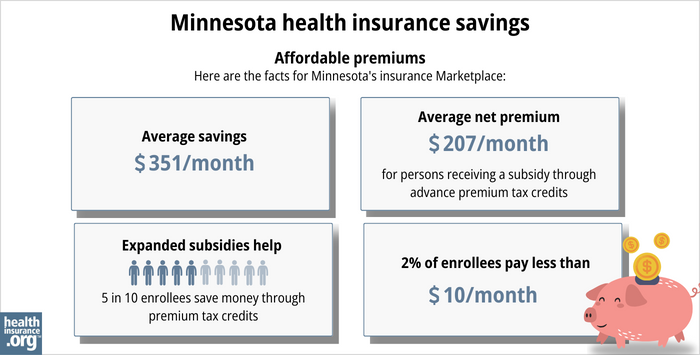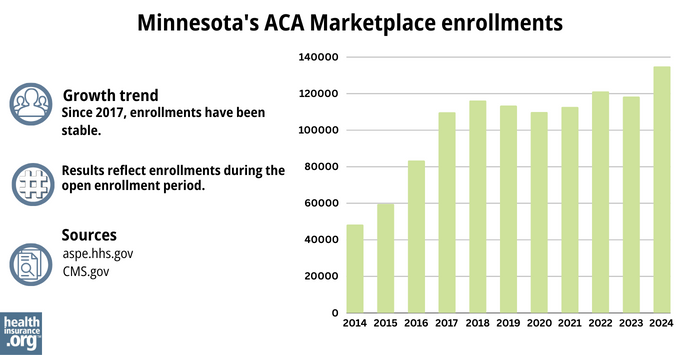

We’ve compiled this guide, including the FAQs below, to help you choose the right health insurance plan for you and your family. An ACA Marketplace/exchange plan – or Obamacare – is a good option for many people who don’t have access to Medicare, Medicaid, or employer-sponsored health insurance. We’re here to walk you through the choices available.
In Minnesota, you can sign up for ACA Marketplace coverage through MNsure , the state’s health insurance exchange/Marketplace, where five private insurers offer health insurance policies. If eligible, you may also get help to lower your monthly insurance cost (premium) and your out-of-pocket expenses through MNsure.
People in Minnesota can also sign up for MinnesotaCare – Minnesota’s Basic Health Program – or income-based Medical Assistance (Medicaid) through MNsure. 1

Hoping to improve your smile? Dental insurance may be a smart addition to your health coverage. Our guide explores dental coverage options in Minnesota.


Learn about Minnesota's Medicaid expansion, the state’s Medicaid enrollment and Medicaid eligibility.


Use our guide to learn about Medicare, Medicare Advantage, and Medigap coverage available in Minnesota as well as the state’s Medicare supplement (Medigap) regulations.


Short-term health plans provide temporary health insurance for consumers who may find themselves without comprehensive coverage. Learn more about short-term plan availability in Minnesota.

To be eligible to enroll in private health coverage through the Marketplace in Minnesota (MNsure), you must:
While most Minnesota residents are eligible to enroll in individual/family coverage through MNsure, eligibility for financial assistance (premium subsidies and cost-sharing reductions) is different. It depends on your income, and to qualify for financial assistance with your Marketplace plan you must:
In Minnesota, you can sign up for an ACA-compliant individual or family health plan from November 1 to January 15 during open enrollment . 6
If you need your coverage to start on January 1, you must apply by December 15. If you apply between December 16 and January 15, your coverage will begin on February 1.
Outside of open enrollment time, you may be eligible to enroll if you experience a qualifying life event , such as giving birth or losing employer-sponsored insurance.
To enroll in an ACA Marketplace plan in Minnesota, you can:
You can also call MNsure’s contact center by dialing 651-539-2099 (or 855-366-7873 if you’re outside the Twin Cities). The contact center operates from 8 a.m. to 4 p.m. from Monday to Friday.
You may find affordable health insurance options in Minnesota by signing up through MNsure.
Under the Affordable Care Act, there are income-based subsidies – a type of financial assistance – called Advance Premium Tax Credits (APTC). APTCs can help lower your premium payments and reduce your overall expenses.
Heading into the open enrollment period for 2024 coverage, MNsure projected that families eligible for APTC in Minnesota would see an average total premium savings of $6,750 on 2024 coverage due to tax credits. 8
By the end of open enrollment for 2024 coverage, more than half (58%) of MNsure’s private plan enrollees were saving an average of $351 per person per month on their 2024 premium expenses – t hose who qualified for subsidies pay an average monthly net premium of $297 . 9
(Although MNsure’s average premium subsidy amount is quite a bit lower than the $536/month national average subsidy, that’s because Minnesota has a Basic Health Program. for people earning up to 200% of the federal poverty level. So while individuals with income under 200% of FPL qualify for large premium subsidies in other states, they instead qualify for premium-free or very low-cost Basic Health Program coverage in Minnesota.)
If your household income is no more than 250% of the federal poverty level, you may also qualify for cost-sharing reductions (CSR). These reductions can lower your deductibles and out-of-pocket expenses. Combining APTCs and CSRs might make an ACA plan the most budget-friendly health insurance choice for you.
You can also find inexpensive health insurance through Medicaid (called Medical Assistance in Minnesota). Check to see if you meet the criteria for Medicaid in Minnesota.
If your income is too high for Medical Assistance but not more than 200% of the poverty level, you may find that you’re eligible for MinnesotaCare. This is the state’s Basic Health Program, which we referenced above as a reason for MNsure’s smaller-than-average premium subsidies.
Minnesota also has a reinsurance program, which helps to keep premiums lower than they would otherwise be for people whose income is too high to qualify for premium subsidies. 10
 subsidy through advance premium tax credits. Expanded subsidy help - 5 in 10 enrollees save money though premium tax credits. 2% of enrollees pay less than $10/month. " width="700" height="355" />
subsidy through advance premium tax credits. Expanded subsidy help - 5 in 10 enrollees save money though premium tax credits. 2% of enrollees pay less than $10/month. " width="700" height="355" />
There are five insurers that offer exchange plans in Minnesota: 12 All five have filed rates and plans for 2025 coverage aswell. 13
PreferredOne, which has only offered coverage outside the exchange for the last several years, exited Minnesota’s individual/family market altogether at the end of 2023. People enrolled in PreferredOne’s individual plans in 2023 had to select a new plan from a different insurer to have coverage in 2024. 14
The availability of plans varies by location. For 2024, most counties in Minnesota offer exchange plans from at least three different insurers, and every county has at least two insurers offering plans through MNsure. 15
For 2025, the following average rate changes have been proposed by the insurers that offer individual/family coverage through MNsure, 13 amounting to an overall average proposed increase of about 8.7%: 16 These proposed rates are under review by the Minnesota Commerce Department; approved rate changes will be finalized before the start of open enrollment for 2025 coverage.
Source: Minnesota Commerce Department 13
Keep in mind that these average proposed rate increases are for full-price plans. However, more than half of the people who enroll through MNsure get premium tax credits that help reduce costs. 9
These subsidies are adjusted each year to match changes in the benchmark plan (the second-lowest-cost Silver plan) in each area. As a result of the American Rescue Plan and the Inflation Reduction Act , the subsidies are larger and more widely available than they were in the past.
If the cost of your current plan increases, you may find that a different MNsure plan might be a better fit for your needs and budget.
For perspective, here’s an overview of how average full-price premiums have changed over time in Minnesota’s individual/family health insurance market:
During the open enrollment period for 2024 coverage, a record-high 135,001 people enrolled in private health coverage through the Minnesota exchange (MNsure). 27 This doesn’t include people enrolled in MinnesotaCare and Medical Assistance.

Source: 2014, 28 2015, 29 2016, 30 2017, 31 2018, 32 2019, 33 2020, 34 2021, 35 2022, 36 2023, 37 2024 38
MNsure : Minnesota’s health insurance marketplace provides financial help for individual plan premiums exclusively to state residents. To reach MNsure for more information, dial (651) 539-2099 or (855) 366-7873 if outside the Twin Cities.
Minnesota Department of Human Services : The Minnesota Department of Human Services offers health care coverage programs and resources. You can call their customer service at 651-297-3862 or 800-657-3672 for assistance.
Local tribal or county health care office : To receive assistance with health care programs, you can contact your local tribal or county health care office.
Minnesota State Health Insurance Assistance Program : You can find information and resources for Minnesota’s Medicare beneficiaries.
Medical Assistance : Minnesota’s Medical Assistance (Medicaid) program helps low-income individuals and families with medical coverage. This program has eligibility requirements, and more information is available on the Minnesota Department of Health website.
Louise Norris is an individual health insurance broker who has been writing about health insurance and health reform since 2006. She has written dozens of opinions and educational pieces about the Affordable Care Act for healthinsurance.org.